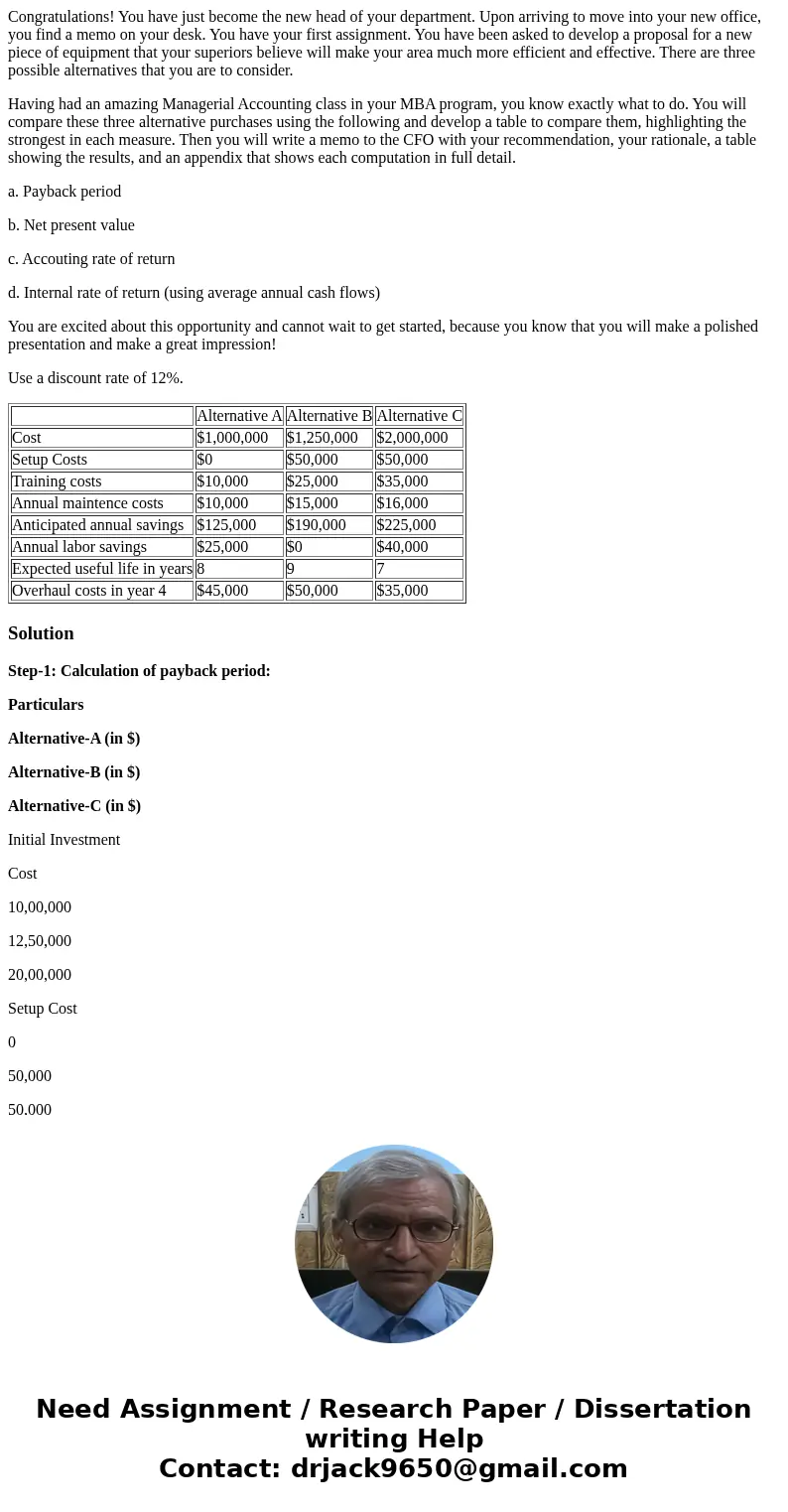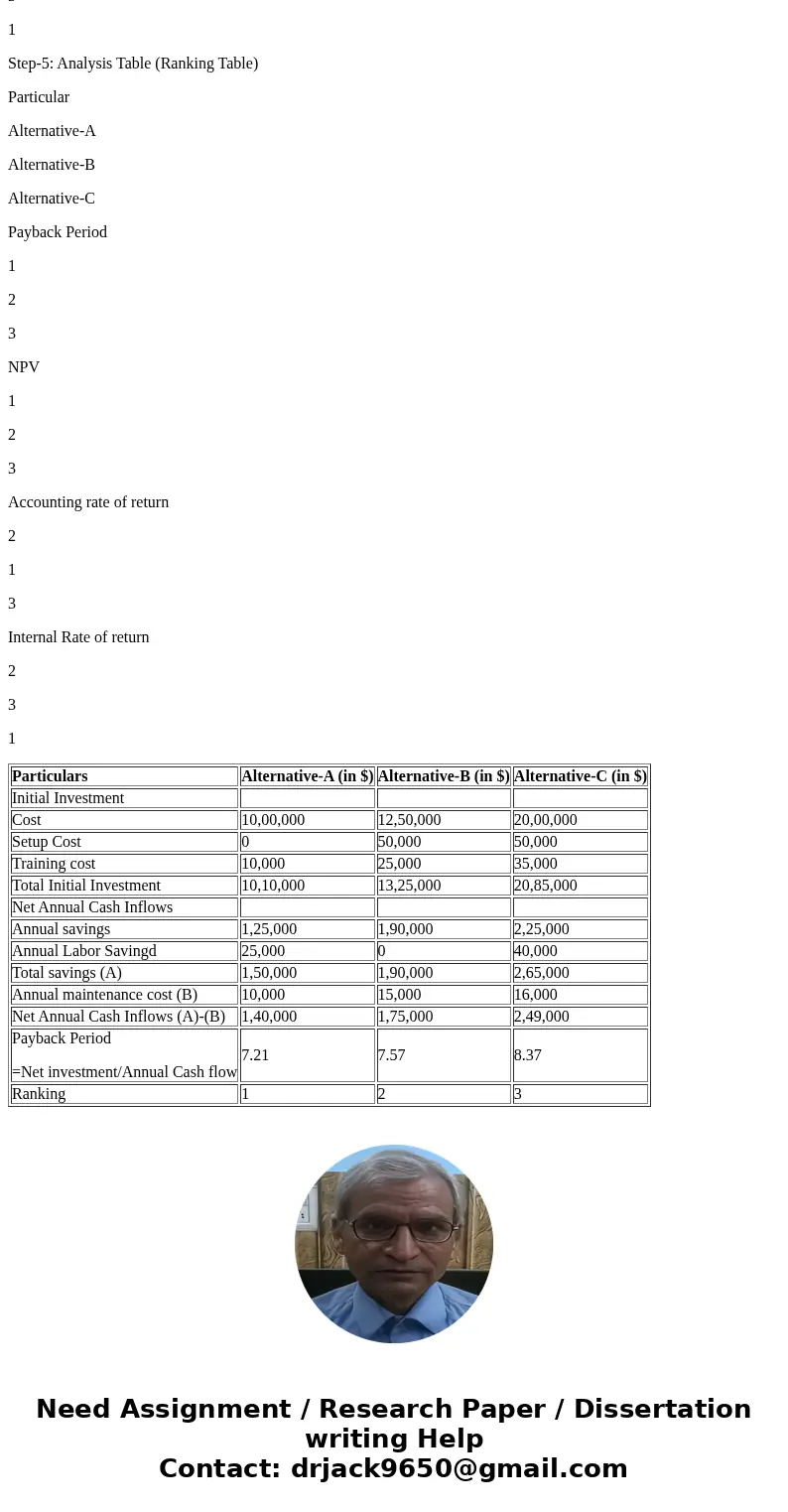Congratulations You have just become the new head of your de
Congratulations! You have just become the new head of your department. Upon arriving to move into your new office, you find a memo on your desk. You have your first assignment. You have been asked to develop a proposal for a new piece of equipment that your superiors believe will make your area much more efficient and effective. There are three possible alternatives that you are to consider.
Having had an amazing Managerial Accounting class in your MBA program, you know exactly what to do. You will compare these three alternative purchases using the following and develop a table to compare them, highlighting the strongest in each measure. Then you will write a memo to the CFO with your recommendation, your rationale, a table showing the results, and an appendix that shows each computation in full detail.
a. Payback period
b. Net present value
c. Accouting rate of return
d. Internal rate of return (using average annual cash flows)
You are excited about this opportunity and cannot wait to get started, because you know that you will make a polished presentation and make a great impression!
Use a discount rate of 12%.
| Alternative A | Alternative B | Alternative C | |
| Cost | $1,000,000 | $1,250,000 | $2,000,000 |
| Setup Costs | $0 | $50,000 | $50,000 |
| Training costs | $10,000 | $25,000 | $35,000 |
| Annual maintence costs | $10,000 | $15,000 | $16,000 |
| Anticipated annual savings | $125,000 | $190,000 | $225,000 |
| Annual labor savings | $25,000 | $0 | $40,000 |
| Expected useful life in years | 8 | 9 | 7 |
| Overhaul costs in year 4 | $45,000 | $50,000 | $35,000 |
Solution
Step-1: Calculation of payback period:
Particulars
Alternative-A (in $)
Alternative-B (in $)
Alternative-C (in $)
Initial Investment
Cost
10,00,000
12,50,000
20,00,000
Setup Cost
0
50,000
50,000
Training cost
10,000
25,000
35,000
Total Initial Investment
10,10,000
13,25,000
20,85,000
Net Annual Cash Inflows
Annual savings
1,25,000
1,90,000
2,25,000
Annual Labor Savingd
25,000
0
40,000
Total savings (A)
1,50,000
1,90,000
2,65,000
Annual maintenance cost (B)
10,000
15,000
16,000
Net Annual Cash Inflows (A)-(B)
1,40,000
1,75,000
2,49,000
Payback Period
=Net investment/Annual Cash flow
7.21
7.57
8.37
Ranking
1
2
3
Step-2: Calculation of Net Present value
Particulars
Alternative-A (in $)
Alternative-B (in $)
Alternative-C (in $)
Initial Cash Outflow (Step-1)
10,10,000
13,25,000
20,85,000
Overahall expesnes in 4th year
45,000
50,000
35,000
PVF @ 12%
0.636
0.636
0.636
PV of ovehall expenses
28,620
31,800
22,260
PV of total cash outflows
10,38,620
13,56,000
21,07,260
PV of Net cash Inflows
Net Annual Cash Inflows (Step-1) (A)
1,40,000
1,75,000
2,49,000
No of Years
8
8
7
PVAF @12% (B)
4.967
4.967
4.564
PV of cash in flows (A)*(B)
6,95,380
8,69,225
11,36,436
Net Present value=PV of cash inflows-PV of cash outflows
(3,43,240)
(4,86,775)
(9,70,824)
Ranking
1
2
3
Step-3: Calculation of Accounting rate of return:
Particulars
Alternative-A (in $)
Alternative-B (in $)
Alternative-C (in $)
Average Annual Profit:
Annual Cash Inflows
1,40,000
1,75,000
2,49,000
No of Years
8
9
7
Total Inflow over period
11,20,000
15,75,000
17,43,000
Less: Overhaul cost
45,000
50,000
35,000
Less: Depreciation
(No salvage value)
10,10,000
13,25,000
20,85,000
Total Profit/(loss) of project
65,000
2,00,000
(3,77,000)
Useful life
8
9
7
Average Annual Profit
8125
22,222
Nil
Average Investment
Initial Investment
10,10,000
13,25,000
20,85,000
At the end salvage value
0
0
0
Average Investment=(initial investment+ At the end salvage value)/2
5,05,000
6,62,500
10,42,500
Accounting rate of return=Average Annual Profit/Average investment
1.6%
3.35%
O%
Ranking
2
1
3
Step-4: Internal Rate of Return:
Particulars
Alternative-A (in $)
Alternative-B (in $)
Alternative-C (in $)
NPV @ 10%
Initial Outflows
10,10,000
13,25,000
20,85,000
Overhall expense at the end of 4th year
45,000
50,000
35,000
PVF @10%
.683
0.683
0.683
PV of Overhall expense
30,735
34,150
23,905
Total Initial outflows
10,40,735
13,59,150
21,08,905
Net annual cash flows
1,40,000
1,75,000
2,49,000
Annuity factor@10%
5.3349
5.7590
4.8684
Annuity cashflows
7,46,886
1007825
12,12231
NPV @10%
(293849)
(351325)
(8,96,674)
NPV @12%
(3,43,240)
(4,86,775)
(9,70,824)
IRR=10%+NPV1*(R2-R1)/(NPV1-NPV2)
10.93%
10.83%
10.96%
Ranking
2
3
1
Step-5: Analysis Table (Ranking Table)
Particular
Alternative-A
Alternative-B
Alternative-C
Payback Period
1
2
3
NPV
1
2
3
Accounting rate of return
2
1
3
Internal Rate of return
2
3
1
| Particulars | Alternative-A (in $) | Alternative-B (in $) | Alternative-C (in $) |
| Initial Investment | |||
| Cost | 10,00,000 | 12,50,000 | 20,00,000 |
| Setup Cost | 0 | 50,000 | 50,000 |
| Training cost | 10,000 | 25,000 | 35,000 |
| Total Initial Investment | 10,10,000 | 13,25,000 | 20,85,000 |
| Net Annual Cash Inflows | |||
| Annual savings | 1,25,000 | 1,90,000 | 2,25,000 |
| Annual Labor Savingd | 25,000 | 0 | 40,000 |
| Total savings (A) | 1,50,000 | 1,90,000 | 2,65,000 |
| Annual maintenance cost (B) | 10,000 | 15,000 | 16,000 |
| Net Annual Cash Inflows (A)-(B) | 1,40,000 | 1,75,000 | 2,49,000 |
| Payback Period =Net investment/Annual Cash flow | 7.21 | 7.57 | 8.37 |
| Ranking | 1 | 2 | 3 |









 Homework Sourse
Homework Sourse